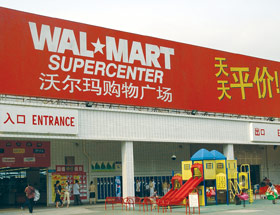
Under pressure from the Chinese federation of labor unions, the world's biggest retailer, Wal-Mart Stores Inc., said on Tuesday it would permit branches union in its Chinese stores if employees requested it.
The 123 million-member All-China Federation of Trade Unions (ACFTU) threatened last month to sue Wal-Mart and other companies based outside China if they refused to set up unions in their China operations.
"Should associates request formation of a union, Wal-Mart China would respect their wishes and honor its obligation under China's Trade Union Law," said the company in a statement faxed to news media. Wal-Mart, based in Bentonville, Arkansas, refers to its employees as associates. "Currently, there are no unions in Wal-Mart China because associates have not requested that one be formed," the statement said.
The ACFTU has not yet provided an official response to Wal-Mart's statement.
The ACFTU is the sole body permitted to organize workers in China and it has been working to expand membership. It had about 131 million members nationwide in 2003.
"Wal-Mart is currently in full compliance with China's Trade Union Law, which states that establishing a union is a voluntary action of the associates," the statement said.
In an earlier statement, Wal-Mart said that its China operations follow the company's global no-union policy and that "Companies in China are not required to have trade unions, and therefore this position is fully consistent with the law," according to a China Radio International report on November 11.
Analysts admit that Chinese laws regarding unions have loopholes of which many private companies take advantage. The Trade Union Law states that companies should set up union branches and that employees can voluntarily join them, but it does not require the companies to push forward union branches. It also indicates that all employees have the right to organize unions, and no company can turn down employees' requests for their establishment.
However, surveys conducted by the ACFTU indicate that awareness of unions and how they may benefit workers is generally low. Federation officials have said that many workers hesitate to express a desire to set up or join a trade union because of concerns over job security.
In a statement of policy on its website, Wal-Mart indicates that although it seeks to maintain an environment of open communication with its associates, it does not believe there is a need for third-party representation. The company is known for actively discouraging unionization: earlier this year an outlet in Quebec became the chain's only unionized store in North America.
Wal-Mart has more than 5,000 outlets in 10 countries employing more than 1.3 million people. It opened its 40th outlet in China early this month, and Bloomberg News has reported that it plans to open as many as 15 new stores in 2005, focusing on smaller provincial cities. Nationwide it employs about 20,000 people.
The company sourced $15 billion worth of products in China last year, or 80 percent of its US imports. If it were a country, it would be China's eighth largest trading partner.
(China Daily, China.org.cn November 24, 2004)
|

